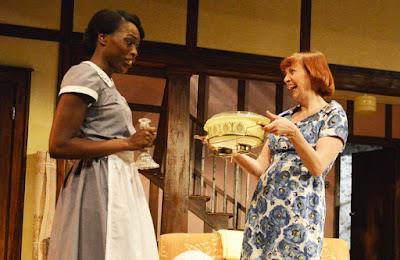Made in Colchester at the Colchester Mercury Theatre
13.04.2016
for The Reviews Hub
Bruce Norris's thought-provoking piece is a companion to the 1959 classic A Raisin in the Sun. Back then, Lorraine Hansbury drew on her own experience to tell the story of the sale of a house in a Chicago suburb. Norris sets his “parallel play” in that very house. Its two acts explore what might have happened off stage in 1959, and, after the interval, half a century later.
Those fifty years have seen a huge shift in the ways society interacts; old prejudices are rejected, old resentments still simmer. The two acts, seven actors playing two sets of neighbours, and the changing house itself, bring hidden feelings to the fore in a sharply observed reflection on human weakness, guilt and hypocrisy. The issues remain racially charged; the reluctance to admit it persists down the years.
Daniel Buckroyd's beautifully crafted production uses a superb cast to form real characters out of what might have been stereotypes; the performances stay just the right side of caricature.
In the first act, we meet the white couple who've sold the house to the black Youngers. They move on Monday. Mark Womack's Russ seems a quiet, affably jocular guy, reading National Geographic, eating up Neapolitan ice-cream from the ice-box. Bev, his wife, sensitively played by Rebecca Manley, offers an unwanted chafing dish – the first of the play's symbols - to her black help, Francine [Gloria Onitiri]. Crass clergyman Jim [a cringingly accurate portrait by William Troughton] tries to help the couple cope with the upheaval and the lingering grief that blights their lives. Ghastly Rotarian Karl [Ben Deery] steers the discussion into increasingly troubled waters, dragging Francine and her husband Albert [Wole Sawyerr] into the murky depths: tambourines, lutefisk and skiing Negroes.
“Let's suppose the tables were turned...” says Karl. And that's just what we see in the second act. The black family now call the shots, defending the memories and the heritage that the area holds for them. Plus ça change … Kevin, comfortably man-spreading, and Lena, seated higher than the others in this awkward, increasingly “confrontational” meeting, argue persuasively against the pleas of Steve and Lindsey [Karl and his wife from 1959] who wish to raze and rebuild. Planning jargon gives way to offensive jokes. Steve proves just as insensitive as Karl; his wife [Rebecca Oldfield], deaf in the first act, pregnant throughout, is touchingly desperate.
Jonathan Fensom's set captures precisely the old-fashioned house – the windows especially eloquent – and its empty ghost. The dialogue, too, is convincingly in period, though I fancy we had problems instead of issues back then. The two halves, almost mirror images, are carefully linked: the geographical arguments, the gloves, Mr Wheeler from the grocery store, “You can't live in a principle.” Only the trunk fails to convince, either as a prop – far too clean to have lain fifty years under the crepe myrtle – or as a symbol in the chilling coda.
There is plenty to laugh at in this bitter satire, which comes garlanded with Oliviers, Tonys and a Pulitzer prize, but we chuckle uneasily as hidden depths are revealed, hypocrisy and repression brought into the open.
production photograph: Robert Day

No comments:
Post a Comment
Note: only a member of this blog may post a comment.